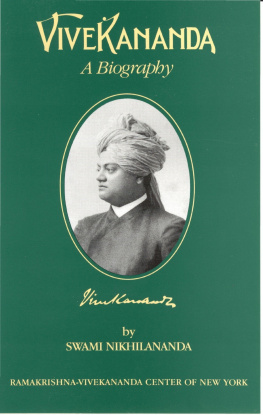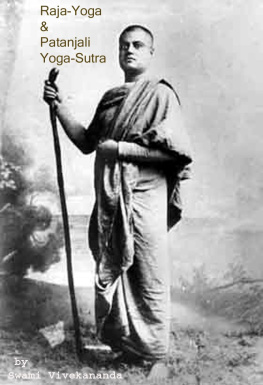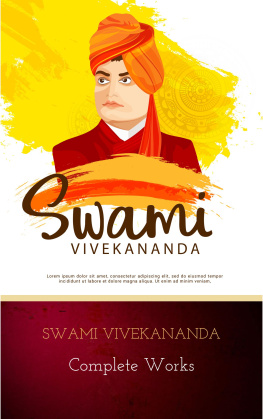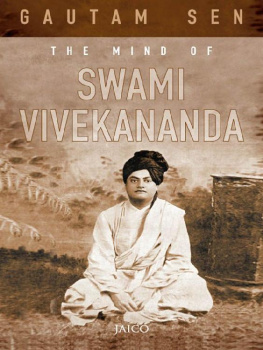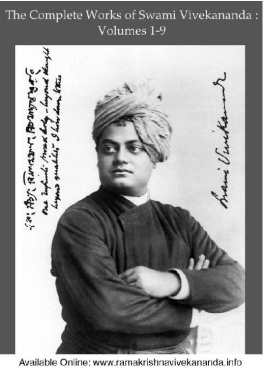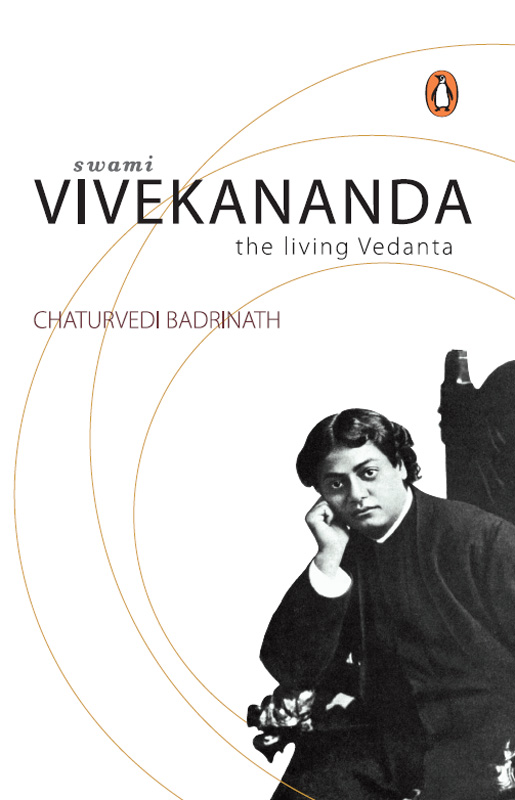Penguin Books is part of the Penguin Random House group of companies whose addresses can be found at global.penguinrandomhouse.com.
This digital edition published in 2012.
This book is sold subject to the condition that it shall not, by way of trade or otherwise, be lent, resold, hired out, or otherwise circulated without the publishers prior consent in any form of binding or cover other than that in which it is published and without a similar condition including this condition being imposed on the subsequent purchaser.
Acknowledgements
Women had a central place in the life and work of Swami Vivekananda. It is, therefore, apt and artistically perfect that it should be a woman, Kamini Mahadevan, editor at Penguin India, and now managing editor, Pearson Education, who invited me to write this book on him. And just as the Swami kept expressing his eternal gratitude to what those women did for him, I wish to express my gratitude both to Kamini Mahadevan and to Penguin India.
I owe a debt of gratitude to Pravrajika Atmaprana of Sri Sarada Math, New Delhi, and I am glad to have this opportunity of expressing it. In March 1996, under the auspices of the Goethe Institute (known in India as Max Mueller Bhavan), I had spoken on Swami Vivekananda and Western Womenthe Living Vedanta. The Pravrajika most graciously gave me not only much of her time in discussing Sister Nivedita, of whom she has written the superb biography mentioned in this book, but also her personal copy of Letters of Sister Nivedita and helped me get a copy for myself. She has been ever so gracious and kind whenever I have called her.
Furthermore, I am grateful to Pravrajika Prabuddhaprana for graciously sparing an afternoon to enable me to meet her during her visit to New Delhi last year. Her two worksTantine, The Life of Josephine MacLeod: Friend of Swami Vivekananda and Saint Sara: The Life of Sara Chapman Bull, The American Mother of Swami Vivekanandaare indispensable for understanding the Swami, and I have derived from both many facts concerning him, hitherto unknown (because concealed) but very significant. The Pravrajika truly belongs to that tradition of Swami Vivekananda in which truth was an abiding passion.
To Tulsi, my daughter, who is thoroughly familiar with the RamakrishnaVivekananda literature, for reading the pages of this book as they were being written and for making suggestions as regards the text that were exceedingly helpful.
I am grateful to Surendra Munshi, to his wife, Srobona, and their daughter Sharika, for finding me a copy of Shrimat Swami Vivekanander Jibaner Ghatanabali, written in Bengali by Mahendranath Datta, Swami Vivekanandas younger brother. Sharika went all over Calcutta (now Kolkata) looking for Mahendranath, and found him. Surendra and Srobona consulted him as regards the suicide of the Swamis (unnamed) sister, translated that portion into English for me, read some of the chapters of this book as they were being written, and offered comments that were most encouraging.
I am grateful to Irina Severin of Switzerland for reading the whole book in its first draft, and for her encouraging comments as from one who was meeting Swami Vivekananda for the first time, in the pages of this book. On reading Chapter 11, she fled to her roomto cry (as she told me later), as Sister Nivedita and Sara Bull had done a little more than a century earlier, on hearing Vivekananda speak of his inner torments. It was not easy for me to write that chapter either.
To Peter Saeverin, for reading the book in its first draft, and for his very insightful comments, particularly on the question of simultaneity in the happenings in a persons life and the difficulty of expressing it in language, with which Chapter 10 opens.
To Gerald Daly, for the loving attention with which he read this book in its final form and for his several insightful and encouraging comments.
I am most thankful to Vijay Kumar Jain who has in Gurgaon, where I lived when this book was being written, a bookshop of old books, for quickly finding Swami Vivekananda: Patriot-Prophet by Bhupendranath Datta, Swami Vivekanandas youngest brother. It was a great relief when Bhupendranath arrived the day I looked for him, to know from him many details (especially some names), not found elsewhere, concerning the family in which the Swami was born, the subject of Chapter 1.
I am most thankful to the Advaita Ashrama, Kolkata, the publishers of Sister Gargis classic six-volume Swami Vivekananda in the West: Some New Discoveries, for permitting me to use some historical material concerning Swami Vivekanandas work and relationships in the West, and incorporating a few quotations from her work.
I am most thankful to my Bengali cook Sumitra for helping me in many small ways during my writing this book, apart from supplying me with ginger tea through the day. Though totally illiterate, she quickly learnt to recognizeby their colour, shape, and the way in which the title of the book is printedall the books pertaining to Swamiji and to Sri Ramakrishna in my study, and would fetch for me, unfailingly accurately, those I wanted from among them. That saved me much labour, for often they were kept in different places. Moreover, wanting to learn, she became my immediate audience on whom I daily tested, successfully, Swami Vivekanandas belief that, if conveyed in a simple language, even a child could understand the Vedanta. Sister Nivedita would have forthwith transferred Sumitra to the Nivedita Girls School!
January 2006 | Chaturvedi Badrinath |


